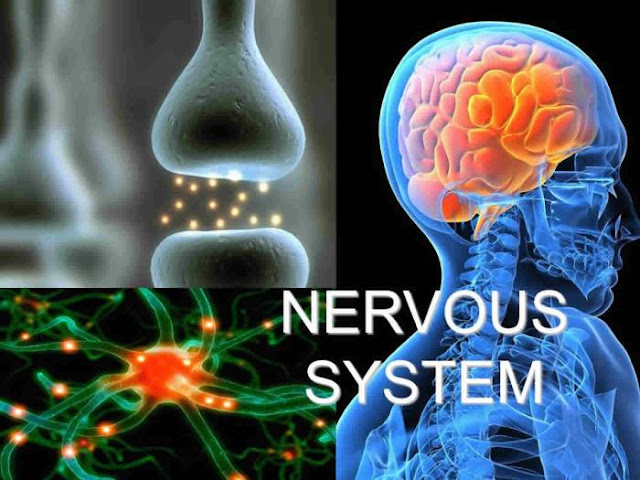Signs and symptoms of nervous system disorders can vary widely dependent on the specific illness and the area of the nervous system that is affected. The nervous system is a multiple network of nerves and cells that transmit indicators between different parts of the body, so when it malfunctions, it can main to a wide range of symptoms. Here are some common signs and symptoms of nervous system disorders:
·
Pain: Nervous system disorders can cause various
types of pain, including sharp, stabbing pain, burning sensations, and dull
aches. This pain can be localized or widespread, depending on the condition.
·
Weakness: Muscle weakness is a mutual symptom of
nervous system disorders. It can affect one muscle, a group of muscles, or the
entire body, depending on the underlying cause.
·
Numbness and Tingling: Many nervous system
disorders can lead to numbness and tingling sensations, often described as pins
and needles. This can occur in specific areas of the body or be more
widespread.
·
Changes in Sensation: Alterations in sensation,
such as hypersensitivity (increased sensitivity to stimuli) or hyposensitivity
(reduced sensitivity to stimuli), can occur. Patients may describe sensations
like a crawling feeling or a lack of sensation in certain areas.
·
Muscle Spasms and Tremors: Involuntary muscle
movements, spasms, and tremors can be indicative of nervous system disorders.
Conditions like Parkinson's disease and multiple sclerosis (MS) are known for
causing these symptoms. Coordination Problems: Difficulty with balance and
coordination is common in many nervous system disorders. This can lead to
unsteady walking, clumsiness, and frequent falls.
·
Changes in Muscle Tone: Abnormal changes in
muscle tone can occur, leading to muscle stiffness (hypertonia) or floppiness
(hypotonia).
·
Vision Problems: Vision disturbances, including
blurred vision, double vision (diplopia), and vision loss, can result from
nervous system disorders affecting the optic nerve or other parts of the visual
pathway.
·
Speech and Swallowing Difficulties: Nervous
system disorders can affect the muscles answerable for speech and swallowing,
leading to speech difficulties (dysarthria) and swallowing problems
(dysphagia).
·
Memory and Cognitive Changes: Conditions like
Alzheimer's disease, dementia, and certain neurological disorders can cause
memory problems, confusion, and changes in cognitive function.
·
Headaches and Migraines: Chronic or severe
headaches, including migraines, can be associated with nervous system disorders.
These headaches may have specific patterns or triggers.
·
Seizures: Epilepsy is a well-known neurological
disorder characterized by recurrent seizures, which are sudden, uncontrolled
electrical disturbances in the brain.
·
Altered Consciousness: Nervous system disorders
can lead to changes in consciousness, ranging from mild confusion to loss of
consciousness (coma).
·
Mood and Behavioral Changes: Some neurological
disorders, such as depression, anxiety, and bipolar disorder, can manifest with
mood and behavioral symptoms.
·
Loss of Reflexes: A decrease or absence of
normal reflexes can be a sign of certain nervous system disorders, including
peripheral neuropathy.
·
Autonomic Dysfunction: Dysregulation of the
autonomic nervous system can lead to symptoms such as extreme sweating,
abnormal heart rate (tachycardia or bradycardia), and blood pressure
fluctuations.
·
Dizziness and Vertigo: Conditions affecting the
inner ear or the vestibular system can cause dizziness, spinning sensations
(vertigo), and a feeling of imbalance.
·
Sleep Disturbances: Nervous system disorders may
disrupt sleep patterns, leading to insomnia, excessive daytime sleepiness, or
sleep-related movement disorders.
·
Difficulty Speaking or Understanding Language:
Aphasia is a verbal disorder that can result from damage to specific areas of
the brain, leading to problems with speaking, understanding, reading, or
writing.
·
Altered Sensory Perception: Some disorders can
cause hallucinations, altered perceptions of reality, or sensory experiences
that are not based on external stimuli.
How many diseases affect your nervous system?
Some of the most common nervous system diseases and disorders include:
Alzheimer's disease
Parkinson's disease
Multiple sclerosis (MS)
Epilepsy
Stroke
Amyotrophic lateral sclerosis (ALS)
Huntington's disease
Migraines
Peripheral neuropathy
Traumatic brain injury (TBI)
Spinal cord injury
Guillain-Barré syndrome
Myasthenia gravis
Cerebral palsy
Autism spectrum disorders
Tourette syndrome
Restless legs syndrome
Narcolepsy
Brain tumors
Neurodegenerative disorders
This list is not exhaustive, and there are many more
specific and rare diseases that fall under the category of nervous system
disorders. Each of these conditions has its unique characteristics, symptoms,
causes, and treatments. It's essential to consult with a medical professional
for an accurate diagnosis and appropriate management if you suspect you have a
nervous system disorder or if you are experiencing symptoms related to the
nervous system.
If you or someone you know is facing any of these symptoms, it is crucial to seek medical evaluation and diagnosis from a healthcare professional. Early discovery and appropriate treatment can significantly improve the prognosis for many nervous system disorders. Neurologists, experts in disorders of the nervous system, are typically involved in the diagnosis and management of these conditions.
